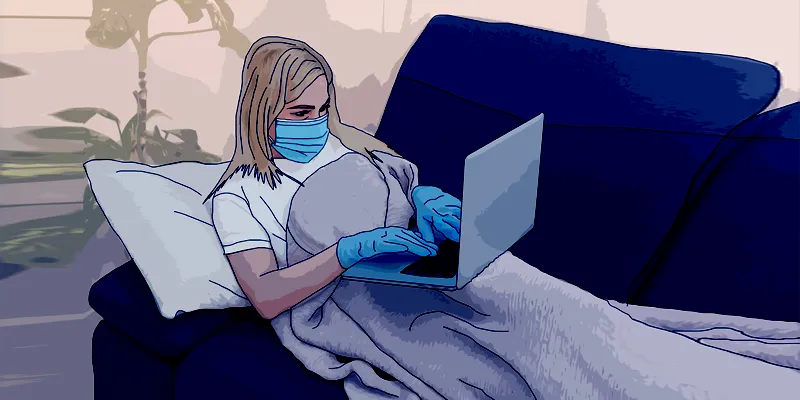Coronavirus: Why work from home no longer seems like a perk even at Google, Facebook
The physical impact of coronavirus is visible, but it’s critical not to ignore the mental health consequences. A survey by US-based anonymous professional network Blind reveals that 56.4 percent of employees, across biggies like Facebook, Google, and Apple, are facing anxiety and loneliness.
For the longest time ever, there was one thing common to employee wish lists across the world: work from home.
The 2019 State of Remote Work report, published by social media management platform Buffer, revealed that almost all respondents - a whopping 99 percent – wanted to “work remotely at least part of the time for the rest of their careers”.
COVID-19 made this wish come true, with companies across the world opting for work for home, but remote working hasn’t been exactly what employees thought it would be. For despite being at home all day, remote workers in the time of coronavirus face key challenges that can affect engagement, satisfaction, productivity, and mental health.
A recent report by Blind, a US-based anonymous professional network with 3.2 million verified users, stated that 52.9 percent of respondents across organisations such as Google, Facebook, Amazon, Apple, , and Walmart were facing loneliness during WFH and in the age of social distancing.

A Blind Network Survey states 56.4 employees across biggies like Facebook, Google, and Apple are facing anxiety and loneliness
The last few pandemics, be it the Spanish flu, Asian Flu, the Hong Kong Flu, and the 2009 H1N1 flu, were different. They were all catastrophic, but not one matches the isolation that has come in the wake of COVID-19. Work, health, relationships…even access to the most basic resources seems to have come under threat.
It may be a great time to reset our inner selves, but the effects of the pandemic on employees’ mental health cannot be ignored. The combined consequences of stress, fear, work pressures, and other strong emotions, along with the demands of home and family life, are taking a toll on mental health.
And sadly, despite all our connected devices, we are no longer connected.
The sly attack of anxiety and loneliness
Social distancing and quarantine go against our very nature. As the philosopher, Aristotle famously said: “Man is a social being.”
Even in “normal” times, research has shown that loneliness and isolation can be “twice as harmful to physical and mental health as obesity”.
Close to 56.4 percent of employees who were part of the Blind survey said they had been “feeling anxiety during WFH and social distancing”. As many as 53 percent said they were experiencing mental health issues.
Employees, long used to coffee breaks and water cooler chats, are missing the communication and connection that going to office entails. The fact that the pandemic and statistics rule every conversation and social media isn’t helping.
“Everywhere I look or read, there are news and reports of how bad things are getting. The only things we can do are stay at one place, and not do much. We cannot go out to help people, we cannot rally together, none of the usual norms work,” says a young woman executive based out of Mumbai.
Julianne Holt-Lunstand, a psychologist and neuroscientist at Brigham Young University, in an analysis published in The New Yorker in 2015, said loneliness can increase the rate of early death by 26 percent, social isolation led to an increased rate of mortality by 29 percent, and living alone can take this up by 32 percent.
Most of the global population is now experiencing loneliness and isolation – and there’s no sign on how long this will continue. However, it’s clear that it’s vital to tackle this mental health issue alongside the physical health crisis.
The burnout syndrome
When the clock hits a particular time in office, it signals pack-up. While working from office, employees have the physical separation of an external workplace and important psychological prompts such as shutting down computers, leaving their work desks, and departing from office.
That is missing for people who work from home, who feel like they are on 24x7. A 2019 survey by Airtasker revealed that 54 percent of remote workers felt “overly stressed” and 45 percent “experienced high levels of anxiety” during the workday.
That same year, a survey by cloud infrastructure company Digital Ocean reported that 82 percent of remote tech workers in the US felt burnt out, with 52 percent saying they “worked longer hours than those in the office”, and 40 percent feeling as though “they needed to contribute more than their in-office colleagues”.
According to the Buffer survey, 22 percent employees struggle with “disconnecting from work”. A report in The New Yorker says the confluence of different circumstances and issues has increased the “risk of depression and the kind of PTSD associated with war zones”.
The fear of losing jobs
Amid the pandemic, jobs worldwide are also taking a hit. A survey by the Centre for Monitoring Indian Economy revealed that India’s unemployment rate could have risen to more than 20 percent as the economy lost jobs after the 21-day nationwide lockdown that began in the last week of March.
Businesses and companies are freezing hiring or slashing jobs.
Sameer Nigam, Co-founder and CEO, , in a video interview with Shradha Sharma, Founder and CEO, YourStory, said it was extremely important to see that jobs weren’t impacted - as much as possible.
“Mixing an employment crisis along with a medical crisis is going to be a huge pressure on all our systems. It is therefore a collective responsibility to ensure at least one part is taken care of,” he said.
Dr Divya Kannan, clinical psychologist with mind.fit, says losing a job can take an emotional toll. “Any type of loss at the moment can feel more intense due to the current global crisis,” she says.

What can be done?
The immediate health benefits of avoiding crowded offices are obvious in the face of the worrying coronavirus pandemic, but it is critical to keep in mind the mental health consequences that work from home can bring.
“It can be helpful to seek support and talk to a professional about the various elements such as the initial shock, anxiety about uncertainty, and anger or helplessness at the situation. Being aware that, at some level, many individuals are facing some variant of loss and embracing the current reality of constant change can empower individuals to start taking concrete steps towards their future and seize any new opportunities that are being created,” Divya says.
The problem is that there is a chance that people remain isolated after the risk dissipates.
Psychologists explain that loneliness is like a biological signal to seek out other human beings and companionships. It may be difficult to seek immediate companionship, but a conversation can go a long way.
Dr Latha Satish Kumar, a psychologist, says: “It takes 21 days to set a habit, and while it is a good time to hone new skills and learnings, one also needs to be cognisant of what patterns they set.” She adds that this could be the time to reset habits and patterns we have always wanted to change.
Divya believes that keeping the mind and body in balance through exercise, sleep, meditation, staying connected to others, and self-care can “aid in improving overall functioning and managing change”.
Numerous studies and research also show the power of gratitude.
Vani Kola, Managing Director, Kalaari Capital, says: “It is important to think of three things you are grateful for when you get up in the morning. That keeps the focus on the meaning of our lives. It is a moment for each one of us to go deep down and figure what matters and makes the difference in our lives.”
Many believe that this time will enhance the value of the little things we always took for granted.
“That simple ice-cream with your friends will be cherished more. Human beings are resilient and we have the ability to come out of things stronger,” says the co-founder of a content language platform.
(Edited by Teja Lele Desai)










